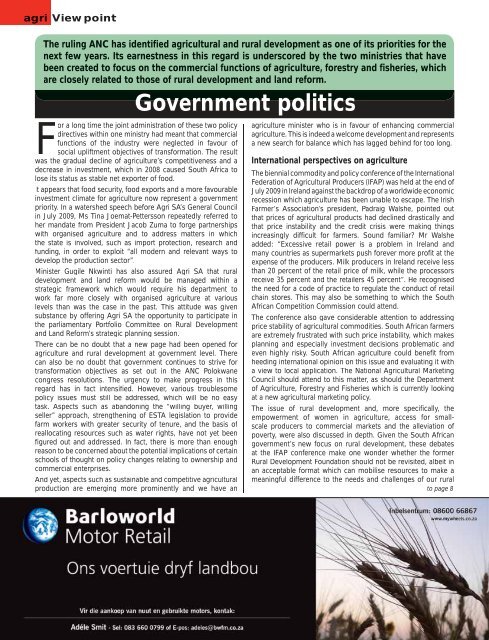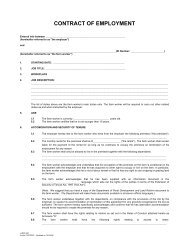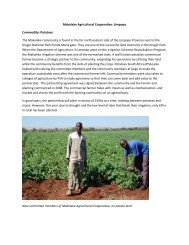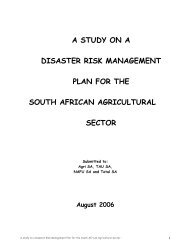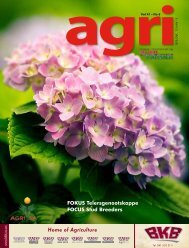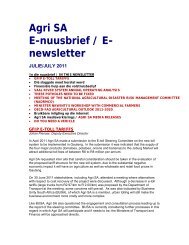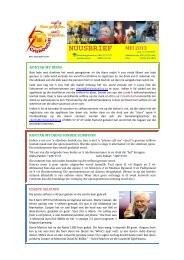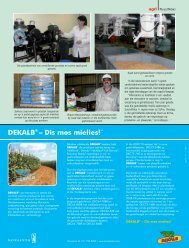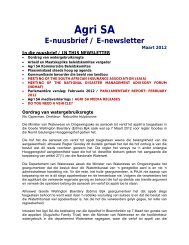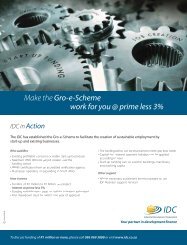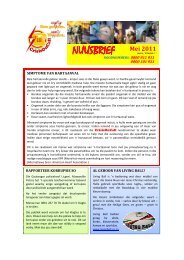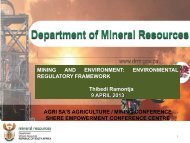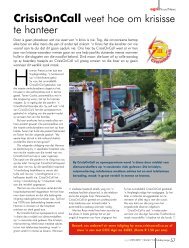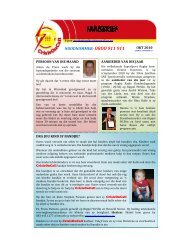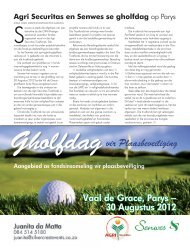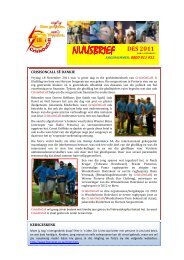Agri AUG SEPT 09.indd - Agri SA
Agri AUG SEPT 09.indd - Agri SA
Agri AUG SEPT 09.indd - Agri SA
You also want an ePaper? Increase the reach of your titles
YUMPU automatically turns print PDFs into web optimized ePapers that Google loves.
agri<br />
Viewpoint<br />
The ruling ANC has identified agricultural and rural development as one of its priorities for the<br />
next few years. Its earnestness in this regard is underscored by the two ministries that have<br />
been created to focus on the commercial functions of agriculture, forestry and fisheries, which<br />
are closely related to those of rural development and land reform.<br />
Government politics<br />
For a long time the joint administration of these two policy<br />
directives within one ministry had meant that commercial<br />
functions of the industry were neglected in favour of<br />
social upliftment objectives of transformation. The result<br />
was the gradual decline of agriculture’s competitiveness and a<br />
decrease in investment, which in 2008 caused South Africa to<br />
lose its status as stable net exporter of food.<br />
It appears that food security, food exports and a more favourable<br />
investment climate for agriculture now represent a government<br />
priority. In a watershed speech before <strong>Agri</strong> <strong>SA</strong>’s General Council<br />
in July 2009, Ms Tina Joemat-Pettersson repeatedly referred to<br />
her mandate from President Jacob Zuma to forge partnerships<br />
with organised agriculture and to address matters in which<br />
the state is involved, such as import protection, research and<br />
funding, in order to exploit “all modern and relevant ways to<br />
develop the production sector”.<br />
Minister Gugile Nkwinti has also assured <strong>Agri</strong> <strong>SA</strong> that rural<br />
development and land reform would be managed within a<br />
strategic framework which would require his department to<br />
work far more closely with organised agriculture at various<br />
levels than was the case in the past. This attitude was given<br />
substance by offering <strong>Agri</strong> <strong>SA</strong> the opportunity to participate in<br />
the parliamentary Portfolio Committee on Rural Development<br />
and Land Reform’s strategic planning session.<br />
There can be no doubt that a new page had been opened for<br />
agriculture and rural development at government level. There<br />
can also be no doubt that government continues to strive for<br />
transformation objectives as set out in the ANC Polokwane<br />
congress resolu tions. The urgency to make progress in this<br />
regard has in fact inten sified. However, various troublesome<br />
policy issues must still be addressed, which will be no easy<br />
task. Aspects such as abandoning the “willing buyer, willing<br />
seller” approach, strengthening of ESTA legislation to provide<br />
farm workers with greater security of tenure, and the basis of<br />
reallocating resources such as water rights, have not yet been<br />
figured out and addressed. In fact, there is more than enough<br />
reason to be concerned about the potential implications of certain<br />
schools of thought on policy changes relating to ownership and<br />
commercial enterprises.<br />
And yet, aspects such as sustainable and competitive agricultural<br />
production are emerging more prominently and we have an<br />
agriculture minister who is in favour of enhancing commercial<br />
agriculture. This is indeed a welcome development and represents<br />
a new search for balance which has lagged behind for too long.<br />
International perspectives on agriculture<br />
The biennial commodity and policy conference of the International<br />
Federation of <strong>Agri</strong>cultural Producers (IFAP) was held at the end of<br />
July 2009 in Ireland against the backdrop of a worldwide economic<br />
recession which agriculture has been unable to escape. The Irish<br />
Farmer’s Association’s president, Padraig Walshe, pointed out<br />
that prices of agricultural products had declined drastically and<br />
that price instability and the credit crisis were making things<br />
increasingly difficult for farmers. Sound familiar? Mr Walshe<br />
added: “Excessive retail power is a problem in Ireland and<br />
many countries as supermarkets push forever more profit at the<br />
expense of the producers. Milk producers in Ireland receive less<br />
than 20 percent of the retail price of milk, while the processors<br />
receive 35 percent and the retailers 45 percent”. He recognised<br />
the need for a code of practice to regulate the conduct of retail<br />
chain stores. This may also be something to which the South<br />
African Competition Commission could attend.<br />
The conference also gave considerable attention to addressing<br />
price stability of agricultural commodities. South African farmers<br />
are extremely frustrated with such price instability, which makes<br />
planning and especially investment decisions problematic and<br />
even highly risky. South African agriculture could benefit from<br />
heeding international opinion on this issue and evaluating it with<br />
a view to local application. The National <strong>Agri</strong>cultural Marketing<br />
Council should attend to this matter, as should the Department<br />
of <strong>Agri</strong>culture, Forestry and Fisheries which is currently looking<br />
at a new agricultural marketing policy.<br />
The issue of rural development and, more specifically, the<br />
empowerment of women in agriculture, access for smallscale<br />
producers to commercial markets and the alleviation of<br />
poverty, were also discussed in depth. Given the South African<br />
government’s new focus on rural development, these debates<br />
at the IFAP conference make one wonder whether the former<br />
Rural Development Foundation should not be revisited, albeit in<br />
an acceptable format which can mobilise resources to make a<br />
meaningful difference to the needs and challenges of our rural<br />
to page 8


